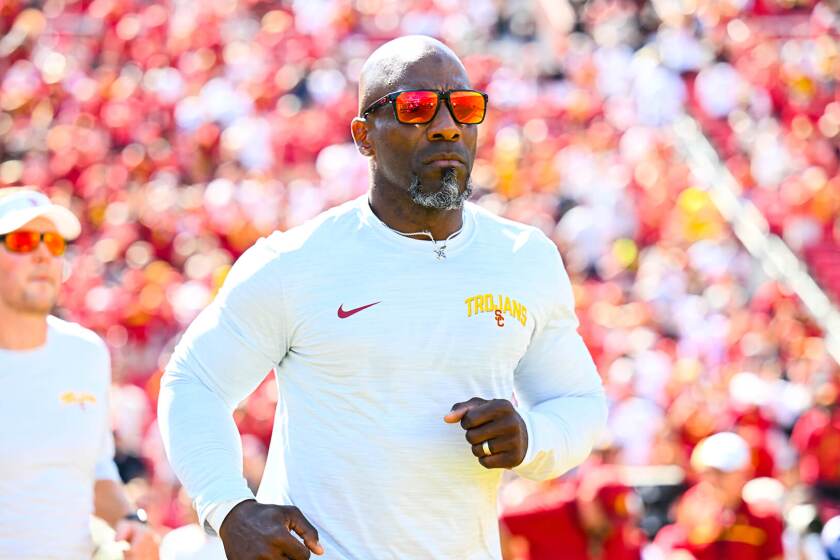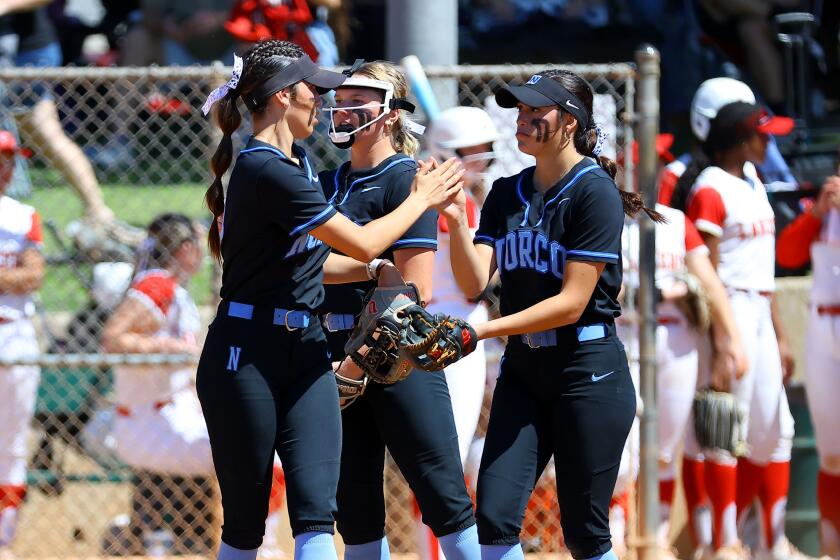When You Wager, He Wins
- Share via
LAS VEGAS — Shortly after 9 a.m. last Saturday, amid the madness of the NCAA men’s basketball tournament, a man dressed entirely in black studied the electronic board flashing point spreads at the Palms Casino Resort.
He had already wagered more than $7,000 that morning, placing half a dozen bets on the Internet and in casinos on sporting events large and small, from arena football to college ice hockey to women’s college basketball.
By Fezzik’s high-rolling standards -- he averages about $60,000 in daily sports wagers -- the day was off to a slumbering start. He was anxious to pick up the pace.
“If you see a guy kicking back, drinking a beer and watching the game after he makes his bet, that guy ... is never going to make serious money. He is a loser,” Fezzik said, walking out of the Palms so briskly he was nearly running. “I’ve been known to sprint to the next betting window.”
Fezzik, or Steve Fezzik, as he has called himself in interviews, is not his real name. It is a pseudonym he says he uses for safety’s sake. Fezzik is a minor celebrity in the demimonde of serious Las Vegas gamblers. Six years ago, he was an insurance executive who drove the crowded freeways to downtown Los Angeles every morning. Now he is a “wiseguy,” the Las Vegas moniker for someone who makes a living trying to outsmart sports books -- the betting parlors inside casinos that take wagers on sporting events.
If the life of Fezzik is any indication, betting on sports professionally is a mentally draining pursuit that has much in common with managing a hedge fund, including a potentially big payoff.
Fezzik, who wagers a large amount of his own money every day along with cash pooled from a small crew of betting partners, boasts that he earns a six-figure salary, largely by predicting the prejudices of “squares,” or casual sports gamblers, and betting big the opposite way before other “sharps” such as he capitalize on the public’s naivete.
Feats of athleticism are irrelevant to serious bettors; theirs is a game of cold, hard numbers, where actual winners and losers often do not matter.
Fezzik does not spend much time scouting the strengths and weaknesses of teams. Instead, he uses his knowledge of statistics to ferret out betting lines that appear askew. Often, those propositions do not center on the outcome of a game, but on how many points a team will score during the second half or whether both teams will amass a certain combined score.
During playoffs, Fezzik said, Las Vegas turns into a candy land for sophisticated gamblers because sports books expand offerings to include oddball bets. Fezzik said one of his favorite wagers was betting big that casino oddsmakers were wrong when they predicted that the Tampa Bay Buccaneers would punt more than the Oakland Raiders in the 2003 Super Bowl. Each team punted five times.
Betting lines do not represent oddsmakers’ opinions of how many points a favored team will win by or what the final combined score of a game will be. Rather, the line is the numerical sweet spot where the casino believes it can entice equal bets on each side of the proposition. By attracting about the same amount of money on each side, the house is guaranteed to win. It charges a fee to place every bet and returns the fee only to winning bettors, so it collects more than enough from one side to pay the other.
Serious bettors, unlike the majority of casual gamblers, understand the difference between reality and a point spread, and seek to exploit it.
Last Saturday, as frat boys and other tourists in Connecticut jerseys crammed casinos to root on their favorite team, Fezzik and other professional bettors were backing the George Mason University Patriots, an underdog in the NCAA basketball tournament.
Because of all the casual bettor money coming in for the top-seeded Connecticut Huskies, they became an eight-point favorite -- a huge margin in basketball. George Mason not only beat the spread but won in overtime.
Betting on Connecticut, Fezzik explained, was a “classic donkey play,” a gambler’s way of describing a wager only a rube would make.
“All of these people, they’re going to lose,” Fezzik said loudly in a casino coffee shop full of tourists, drawing amused stares. “I would agree that 99% of sports bettors eventually lose. But the guys I know, the math geeks like me who take this seriously, they don’t lose. They may only win 54% of the time, but that adds up.”
Like many big-time bettors, Fezzik -- the name of the strongman played by the late wrestler Andre the Giant in the movie “The Princess Bride” -- strives to stay incognito. He says that one casino has banned him for winning too often, and that he would be an easy mark for thieves if his identity were widely known because he sometimes carries tens of thousands in cash.
Fezzik agreed to discuss how he makes a living only on the condition that his actual name not be revealed, but he provided it to The Times so his life’s story could be confirmed.
Fezzik, 42, is a former high school chess wizard from Dayton, Ohio. He graduated from Northwestern University in 1986 and became an actuary, or statistician, who calculated insurance risks.
He rose to vice president at Transamerica Asset Management. But he grew bored and became consumed by a passion he had picked up after college: sports betting. In 2001 he left Los Angeles, and now lives in a modest apartment near the Las Vegas Strip with his girlfriend, whom he met at a Brentwood Starbucks.
“My parents used to disapprove,” Fezzik said. “But since I had some success in the business world, they understand that I could do other things.”
Despite his belief that going public is bad for a bettor, Fezzik could not resist the allure of fame. He has a website, Fezzik’s Place, where he dispenses betting advice, posting his picks beside a picture of himself camouflaged in cheap sunglasses and a large Afro wig. He also served as the host of a local radio show on gambling last year.
To demonstrate his ability to consistently win by betting on sports, Fezzik this year began the Fezzdaq, an online index where he posts some of his daily wagers. Thanks to an extraordinary run in pro and college hoops, the Fezzdaq quadrupled -- far outdistancing the Dow Jones, Nasdaq and S&P; 500 indexes. But in a sign of how quickly gambling fortunes can fall, the Fezzdaq has lost more than 20% of its value since March 20.
In a sense, Fezzik is a relic. The heyday of professional sports betting in Las Vegas passed long ago. Many serious gamblers now take their action to cyberspace, where offshore casinos offer higher betting limits and lower fees.
Las Vegas casinos charge 10% in “juice,” or fees, to place a wager, which means a gambler has to bet $110 to win $100. That typically requires bettors to win more than 52% of the time just to break even.
Citing their built-in advantage, casino oddsmakers do not worry about serious gamblers such as Fezzik. Over time, they say, they will prevail.
“The sharp players get to pick and choose, and they can find the spots where they think they have an advantage,” said Rich Baccellieri, a blunt Bronx native who manages the Palms Race and Sports Book. “But as long as they are laying $11 to win $10, I’ll take my chances with them.”
On most days, Fezzik spends hours at his computer scouring the sports books for miscalculated or outdated point spreads he can pounce on.
During Hurricane Katrina, Fezzik noticed some sports books had not adjusted their line on how many games the New Orleans Saints would win during in the upcoming NFL season. They were taking wagers on whether the Saints would win more than seven games at a time when the Superdome was filled with evacuees.
The Saints, forced to play their season outside New Orleans, won only three games.
When Fezzik finds such opportunities, he calls his betting partners, men with nicknames such as “Midnight Cowboy” and “Eight of Clubs,” who rush to the sports books to place the wagers. Timing is crucial, because the spreads can change in a matter of minutes as other professionals pounce on the same mistake.
In Nevada, it is illegal to hire messengers to place wagers, so Fezzik and his colleagues pool their money and share the winnings. They bet $100 to $10,000 a pop, from a bankroll accrued over more than a decade of calculated gambling. About once a week, Fezzik places many of the wagers himself.
In the middle of his mercurial sprint last Saturday from one sports book to the next, Fezzik chatted up a colleague at the posh Wynn Las Vegas resort to find out which teams Alan Boston, another professional gambler, was putting his money on. Fezzik commanded his crew to piggyback on Boston’s picks: UCLA and Louisiana State University. They bet $6,000 on LSU and $8,000 on UCLA.
Fezzik then hopped into his black Pontiac Grand Am and drove feverishly to Primm, a town of less opulent casinos near the California state line. The Primm Valley Resort & Casino took smaller bets than the books on the Strip, but offered better odds. Fezzik bet $500 on unheralded Colorado College to beat Cornell in hockey -- and lost.
On the way back to Las Vegas, Fezzik appeared to lose his nerve.
Midnight Cowboy called to tell Fezzik that LSU was losing, 9 to 4, in the basketball game to Texas. Fezzik ordered him to go on the Internet immediately and bet $1,000 on Texas, partially canceling his earlier bet by wagering on both sides in the game.
Minutes later, Midnight Cowboy called back.
“Now LSU is dominating? How could we know they would score eight straight?” Fezzik said, exasperated. He debated yet another bet -- more money on LSU -- but decided to leave the game alone, and hung up.
Boston, whose specialty is college basketball, was golden on this day. Both of his picks would win.
Fezzik returned to the Palms for a bit of fun with the latest technological advance to hit the sports books: real-time gambling. Known as Rapid Bet Live, it allows gamblers to wager small amounts on whether a baseball pitcher will throw a strike or ball, or which team will make the next three-point shot in basketball, simply by hitting a touch screen.
But Rapid Bet Live proved to be too popular: There were no spaces available. So Fezzik coached four tourists from Chicago on when to push the button to correctly guess the next foul in the Texas-LSU basketball game. The tourists all won several dollars after making small-time bets. Within seconds, the casino turned off the option to bet on fouls because there were too many winners.
Though Fezzik disregards the notion that he might be addicted to gambling, he admits that, like a winning coach who expects success, the losses now dampen his spirits far more than the wins lift them.
After months of aggressive sports betting, building to a climax with Monday’s NCAA basketball championship, Fezzik said he needed a vacation from Las Vegas -- but not, apparently, from the world of high-stakes gambling. He planned to go to Lake Tahoe, to get in a little hiking during the day and play poker by night.
More to Read
Go beyond the scoreboard
Get the latest on L.A.'s teams in the daily Sports Report newsletter.
You may occasionally receive promotional content from the Los Angeles Times.










